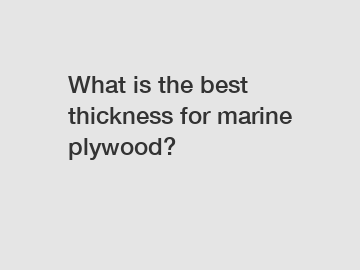Apr. 05, 2024
Marine plywood is a durable and versatile material that is commonly used in boat building and marine construction projects. When it comes to choosing the right marine plywood for your project, one of the key considerations is the thickness of the plywood. The thickness of marine plywood can vary depending on the specific requirements of the project, but there are some common guidelines that can help you determine the best thickness for your needs.
Thickness Options for Marine Plywood.
Marine plywood is available in a variety of thicknesses, ranging from 4mm to 25mm. The most common thicknesses for marine plywood are 6mm, 9mm, 12mm, and 18mm. The thickness of marine plywood that is best suited for your project will depend on a number of factors, including the size and type of the project, as well as the specific requirements for strength and durability.

For smaller projects, such as furniture or decorative items, a thinner plywood may be sufficient. Thinner plywood is also easier to bend and shape, making it ideal for projects that require curved or intricate designs. However, thinner plywood may not be as strong or durable as thicker plywood, so it may not be suitable for heavy-duty applications.
On the other hand, thicker plywood is better suited for larger projects that require more strength and durability. Thicker plywood is also less likely to warp or bend under heavy loads, making it ideal for applications where stability is critical. However, thicker plywood is also heavier and more difficult to work with, so it may not be the best choice for all projects.
Factors to Consider When Choosing Thickness.
When selecting the best thickness for marine plywood, there are several factors to consider:
1. Strength and Durability: Thicker plywood is generally stronger and more durable than thinner plywood, so it is important to consider the specific requirements of your project when choosing the thickness.
2. Weight: Thicker plywood is heavier than thinner plywood, so it is important to consider the weight of the plywood when planning your project.
3. Cost: Thicker plywood is typically more expensive than thinner plywood, so it is important to consider your budget when choosing the thickness.
4. Project Requirements: Consider the specific requirements of your project, such as the size, type, and intended use of the project, when selecting the thickness of marine plywood.
In general, thicker plywood is recommended for larger projects or applications that require more strength and durability, while thinner plywood is suitable for smaller projects or applications that do not require as much strength.
Conclusion.
In conclusion, the best thickness for marine plywood will depend on the specific requirements of your project, including the size, type, and intended use of the project. Thicker plywood is generally recommended for larger projects that require more strength and durability, while thinner plywood is suitable for smaller projects or applications that do not require as much strength. By considering factors such as strength, weight, cost, and project requirements, you can choose the right thickness of marine plywood for your needs.
If you have any questions or need assistance in choosing the best thickness of marine plywood for your project, please do not hesitate to contact us.
If you want to learn more, please visit our website marine plywood grades, Commercial Plywood, 20mm marine plywood.
Previous: Which softwood plywood grades are best for furniture?
Next: Ultimate Guide to Plywood Birch: Everything You Need to Know
If you are interested in sending in a Guest Blogger Submission,welcome to write for us!
All Comments ( 0 )